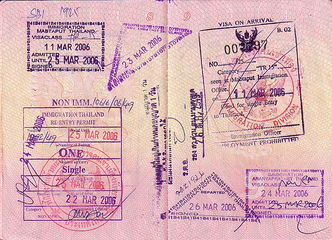Different Types of Thai Visas and How to Get Them

The land of smiles draws in millions of tourists every year, many of whom decide to extend their stay and if you are planning to be one of them, then here are some insider’s tips. For the record, I have been living in Thailand for over 7 years; coming here on an exchange program, I fell in love with the place and have been staying here ever since.
Now if you are going to stay here for more than a month, you need to arrange for a visa. There are many different types of visas in Thailand which you can apply for depending on what you intend to do here.
(Sergey / Flickr / CC-BY-SA)
#1 -- Tourist Visa
The first month for persons of most western countries is free, although this rule does vary depending on the relationship between your home country and Thailand. People of Chinese, African and some Middle Eastern countries will need to buy a visa on arrival which is valid for 15 days or a regular visa from a Thai embassy in their country which is typically valid for 30 or 60 days.
The majority of foreigners who are living here choose to get a tourist visa, which is renewed every 60 days by doing what is popularly known as a – “visa run”, let me explain - If your free 30 day period has elapsed, you can cross borders into a neighboring country such as Cambodia, Laos or Singapore and get a new visa and return back to Thailand. These visa runs typically cost around 3,000 to 10,000 Bahts ($90 to $310) per trip. The tourist visa itself will cost $30 and can be extended in an immigration center once for another 1,900 Bahts.
#2 -- Non-Immigrant Education Visa
On the other hand, if you cannot be bothered with visa runs, then you can also enrol into a language school which will entitle you to a 1 year education visa, costing 2,000 Bahts ($62) paid at the local embassy and 1,900 Bahts ($59) every 3 months for extension.
The only hassle you will have to put up with, in this case, will be to go to the friendly immigration center in the town that you are staying every 90 days and pay the extension fee.
#3 -- Non-Immigrant Business Visa
There are other ways to stay here too; you can get a job in Thailand which will both secure you financially, while helping you develop a better feel for the place. To land a job, you are required to purchase a Type “B” non-immigrant visa, along with a work permit; the latter will be provided by the organization you sign up with. These visas are valid for 3 months from the time of purchase, after which they are extended to a year.
A single entry Type “B” visa costs 2,000 Bahts ($62), and a multiple entry version costs 5,000 Bahts ($155). Most foreigners choose to teach English, mathematics or sciences in an educational or vocational institute here.
There is a huge demand for teachers and you can quickly get absorbed into a school, college, university or private training facility.
#4 -- Type "O" Marriage Visa
Finally, for the lucky few who have found their better half in Thailand, there is a marriage visa as well. A marriage visa is called Type “O” and is valid for a year. It has certain financial requirements attached to it which include a minimum monthly income of 40,000 Bahts ($1,245), you must also have at least 400,000 Bahts ($12,450) in a local bank account for 2 months before you apply for the visa.
Finally, you will need to pass a police clearance and produce a medical certificate, for the immigration authorities.
Each of the visas mentioned above has its own rules and allows you to stay for a certain period of time. It is crucial that you adhere to the rules laid out for the visa you apply for, as the Thai immigration does not look kindly upon those who try to snivel their way around them. There are plenty of horror stories from foreigners who thought they could pull a fast one, only to end up in a jail cell, or being deported. Not trying to scare you away but if you really want to enjoy your time here, then be sure to prepare yourself mentally, and financially before you arrive. This will go a long way in ensuring that your stay here is a pleasant one.
Now if you are going to stay here for more than a month, you need to arrange for a visa. There are many different types of visas in Thailand which you can apply for depending on what you intend to do here.
(Sergey / Flickr / CC-BY-SA)
#1 -- Tourist Visa
The first month for persons of most western countries is free, although this rule does vary depending on the relationship between your home country and Thailand. People of Chinese, African and some Middle Eastern countries will need to buy a visa on arrival which is valid for 15 days or a regular visa from a Thai embassy in their country which is typically valid for 30 or 60 days.
The majority of foreigners who are living here choose to get a tourist visa, which is renewed every 60 days by doing what is popularly known as a – “visa run”, let me explain - If your free 30 day period has elapsed, you can cross borders into a neighboring country such as Cambodia, Laos or Singapore and get a new visa and return back to Thailand. These visa runs typically cost around 3,000 to 10,000 Bahts ($90 to $310) per trip. The tourist visa itself will cost $30 and can be extended in an immigration center once for another 1,900 Bahts.
#2 -- Non-Immigrant Education Visa
On the other hand, if you cannot be bothered with visa runs, then you can also enrol into a language school which will entitle you to a 1 year education visa, costing 2,000 Bahts ($62) paid at the local embassy and 1,900 Bahts ($59) every 3 months for extension.
The only hassle you will have to put up with, in this case, will be to go to the friendly immigration center in the town that you are staying every 90 days and pay the extension fee.
#3 -- Non-Immigrant Business Visa
There are other ways to stay here too; you can get a job in Thailand which will both secure you financially, while helping you develop a better feel for the place. To land a job, you are required to purchase a Type “B” non-immigrant visa, along with a work permit; the latter will be provided by the organization you sign up with. These visas are valid for 3 months from the time of purchase, after which they are extended to a year.
A single entry Type “B” visa costs 2,000 Bahts ($62), and a multiple entry version costs 5,000 Bahts ($155). Most foreigners choose to teach English, mathematics or sciences in an educational or vocational institute here.
There is a huge demand for teachers and you can quickly get absorbed into a school, college, university or private training facility.
#4 -- Type "O" Marriage Visa
Finally, for the lucky few who have found their better half in Thailand, there is a marriage visa as well. A marriage visa is called Type “O” and is valid for a year. It has certain financial requirements attached to it which include a minimum monthly income of 40,000 Bahts ($1,245), you must also have at least 400,000 Bahts ($12,450) in a local bank account for 2 months before you apply for the visa.
Finally, you will need to pass a police clearance and produce a medical certificate, for the immigration authorities.
Each of the visas mentioned above has its own rules and allows you to stay for a certain period of time. It is crucial that you adhere to the rules laid out for the visa you apply for, as the Thai immigration does not look kindly upon those who try to snivel their way around them. There are plenty of horror stories from foreigners who thought they could pull a fast one, only to end up in a jail cell, or being deported. Not trying to scare you away but if you really want to enjoy your time here, then be sure to prepare yourself mentally, and financially before you arrive. This will go a long way in ensuring that your stay here is a pleasant one.
